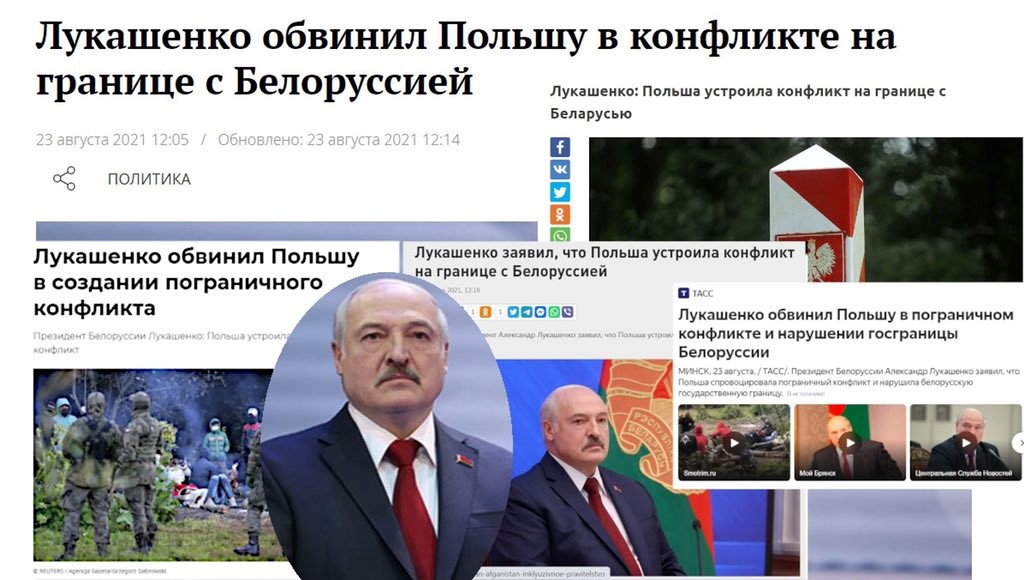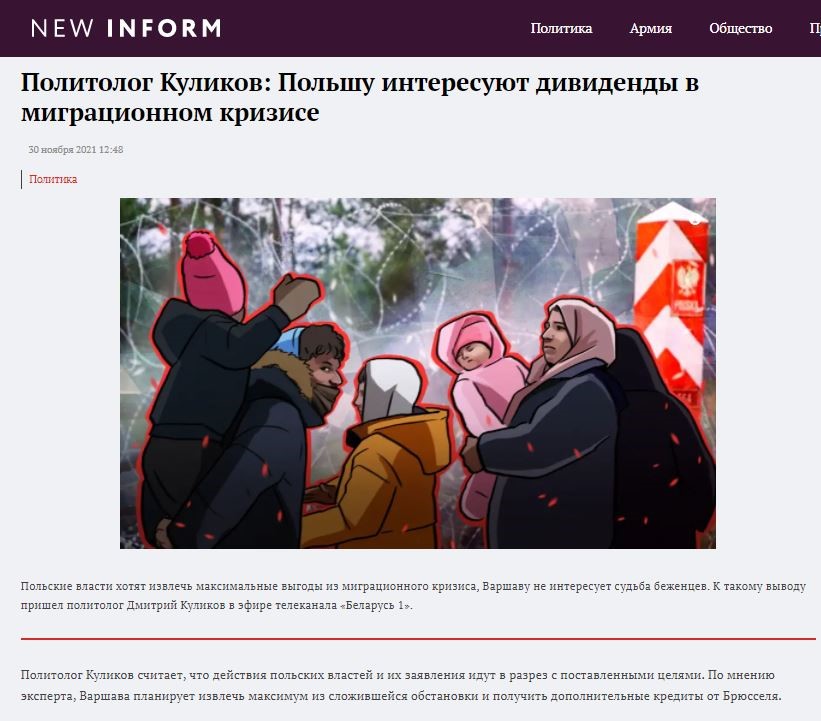Disinformation offensive
17.12.2021
In addition to activities aimed to destabilize the situation on the Belarusian-Polish border, a systematic information warfare is being waged against Poland. It is an attempt to portray Poland as being responsible for the crisis and eager to escalate it. The objectives of these efforts go far beyond migration. Russian and Belarusian top officials as well as propagandists notorious for smearing Poland are actively involved in this hostile campagn.

The Russian media has been pushing propaganda materials implying that it is the Polish government that is to blame for the situation on the Belarusian-Polish border. Warsaw is being accused of breaking international law, putting the migrants at risks and making political profits on the crisis. The most important political figures of Russia and Belarus as well as "full-time" propagandists whose main target is Poland are actively involved in amplifying and spreading these bogus narratives.
The propaganda attacks are led by Vladimir Putin who has attacked Poland many times. In a recent conversation with the representatives of the Red Cross, the Russian strogman has again slandered the Polish authorities. He accused them of using aggression against the migrants and violating European law and standards. He went as far as implying that Poland was responsible for mass deaths of migrants on its territory and appealed to the international community for a response.
Earlier this year, at the end of November, the focus of Putin's smear campaing was on the entire West. He falsely suggested that the bloc was benefiting from the "migration" crisis. In his narrative, it was the Western countries that took advantage of the crisis and acted so as to prolong the destabilization on the EU border. The Russian president argued that the crisis was used to put political pressure on Minsk. At the same time, he attacked the West once again with insinuations that it was not fulfilling its humanitarian obligations.
Apart from Putin, other senior state officials from the Kremlin have also joined this anti-Polish propaganda campaign. The goal remains the same - to depict Poland as the main culprit of the border crisis. Dmitry Pieskov, the Kremlin spokesman, directly accused Poland making unjustified attempts to tie the whole issue with Russia. Pieskov emphasized that talking about any ties between Russia and the situation on the Belarusian-Polish border was unfounded. He once again accused Poland of being responsible for "a humanitarian catastrophe". At the same time, Pieskov attacked the Polish authorities for allegedly trampling on European values.
Maria Zakharova, spokesman for the Russian Ministry of Foreign Affairs, is also carrying out constant attacks on the West, Poland and Lithuania. For many weeks, she has been presenting lies about the alleged responsibility of the West for the crisis on the border with Belarus.
A couple of months ago Zakharova argued that the migration crisis on the Belarusian-Polish border was caused by Poland. She suggested that the wave of migration was a result of the participation of the Polish Armed Forces in the mission in Iraq. In her other statements, the spokesman for the Russian Foreign Ministry smeared Poland and Lithuania with false claims that their activities were against the law and in breach of the human rights. Both countries were also caught in Zakharova's crosshairs for protecting their borders with Belarus.
Zakharova's attacks on Poland and Lithuania were aimed at blaming these countries for the situation on their borders with Belarus, as well as forcing the EU countries to succumb to the pressure of the influx of migrants.
Belarusian officials also constantly carry out anti-Polish activities. In his statements, the dictator A. Lukashenko tries to paint a negative image of Poland. In his narrative, it is Poland that provokes the conflict on the border and violates the Belarusian border. He also accuses the Polish border guards of "pushing refugees" back into the territory of Belarus.
In his statements, Lukashenko uses the alleged aggression of Poland to demonstrate that Minsk “must in this situation” use all possible means to prevent potentially dangerous actions by an alleged hostile neighbor.
The alleged aggression by Poland is presented not only as actions against Belarus itself. In times of border crisis, we are also accused of using the army against migrants.
The military maneuvers in the territory of the Republic of Poland were presented by the regime leader as "Poland's way of fighting against migrants." Therefore, the above actions by Poland are to be justified by the Belarusian state of readiness at the western border.
Along with Lukashenko, other Belarusian officials are also joining the choir attacking Poland, pointing out, inter alia, that Warsaw benefits from the political situation on the border with Belarus. The permanent representative of Belarus to the UN, Walenty Rybakow, argued that the government of the Republic of Poland feels the benefits of the crisis, because it has a chance to “get more money from the EU and counts on greater importance in European politics”.
The Belarusian Minister of Foreign Affairs Vladimir Maki attacked Poland, arguing that the migration crisis led the Polish government to divert the public's attention away from problems related to domestic politics and disputes in relations with Brussels. His statement is also an attempt to insinuate that Poland is a beneficiary of the crisis, so it should depend on its duration.
The secretary of state of the Belarusian Security Council, Aleksander Volfovich, accused Poland in recent days that "it may deliberately create a border incident, counting on a response from the Belarusian side."
The narrative against Poland is maintained and fueled by the Kremlin and Minsk propagandists who are engaged in the information warfare efforts against Poland on a daily basis. One such commentator accuses Poland of using migrants in its play. Dmitry Kulikov's comment is also an attempt to show that Poland is playing on the escalation of the conflict, as it wants to get more money from Brussels. The propagandist argues that "Poland benefits from the crisis."
Another propagandist, Vladimir Kornilov, involved in Russia's propaganda activities against the West, argues that the crisis is "like manna from heaven" for the Polish government. In his narrative, thanks to the crisis, "the problems of the Polish government have been removed", while Europe and NATO support Poland. Kornilov suggests that Poland is the beneficiary of the crisis, as it "distracts" from Poland's alleged problems.
Another commentator, Mikołaj Mieżewicz, argues that the crisis is beneficial for Poland. At the same time, the propagandist attacks the Polish government, arguing that it is not acting in favor of Poland and Poles, but only a specific party.
Another propagandist spoke in the same vein. Radosław Czarnecki stated that "Poland is using the crisis to divert attention from the problems in the country".
Another propagandist involved in Russia's actions against Poland, Tomasz Mateichuk, even argued that "Poland is preparing for a military confrontation with Belarus."
Furthermore, another propagandist argued that Poland was using the migration crisis to "militarize" the eastern part of the country. Aleksander Cichański presented the support that soldiers provide to the Border Guard and Police on the border with Belarus, as an example of the expansion of offensive military infrastructure by the Republic of Poland.
At the same time, he pointed out that the crisis is also a "pretext" for further modernization of the Polish Armed Forces and increasing the army's potential. These theses fit in the constant narrative of the Kremlin, which accuses Poland and NATO of being aggressive towards Russia, a threat to the Russians. Such accusations are used by Russian propaganda because they allow the Russians to unite around the elite in the Kremlin, and additionally justify the aggressive policy and expansion of the Russian army's offensive arsenal.
The analysis of the content provided by the so-called Russian and Belarusian commentators point out that they are distributing narratives consistent with what the authorities in Moscow and Minsk are saying. The activities of the cited commentators should therefore be treated as the implementation of state guidelines on information warfare against the West, especially Poland.
The narratives spread by Russian and Belarusian propaganda on occasion of the border crisis aim to:
● prove that Poland is in breach of European standards and international law
● portray Poland as a country responsible for torture and mass deaths of people
● slander Poland in the international arena and present it as a "handfull"
● show that the actions of the Polish government give rise to threats to the entire EU and NATO
● provoke an international isolation of Poland .
The propaganda activities of Moscow and Minsk must be analyzed in terms of their importance and value for Russia. Otherwise, their meaning and real threats may not be grasped. Russia's military doctrine assumes that disinformation and information warfare may be an element of state aggression against other countries. They can also be part of hostile operations.
The presence of a permanent and systemic disinformation and propaganda campaign at the time of a state crisis, carried out de facto in the interest of Russia, must therefore be treated as a coherent element of anti-Polish efforts. Russia uses both informational and political actions against the countries of NATO's eastern flank. The actions of the Kremlin are intended to support Moscow's achievement of its strategic goals: forcing the American presence out of Central and Eastern Europe and a permanently reduce the level of security on NATO's eastern flank. This is to be helped by information warfare efforts targeted against Poland aimed at isolating our country in the international arena. If our allies accept the perspective of the Russian adversary, this will result in the implementation of this extremely dangerous goal for NATO.
Spokesman for the Minister- Coordinator of Special Services














